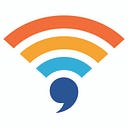Know Peace Online: Know Your Audience
Six guideposts to a better world online. This week’s guidepost: #KnowYourAudience
Ever since childhood, I wanted to be a writer. As I got older, I got to live my dream.
Thus, I’ve had to think about the concept of “audience” for years. As a journalist, I wrote news stories, reviews and opinion pieces, for audiences ranging from policy wonks to general readers. I wrote romance novels and political biographies. I prepared PowerPoints and memos to executives. I wrote satirical skits for theatrical shows and song lyrics to roast departing colleagues.
Each kind of writing had a different audience — and a distinct style.
If you’re not a professional writer, the notion of “audience” may be more puzzling. Why, you might ask, does it matter? But everybody does — or should — modify their voice, based on their audience. A grandparent receiving a thank-you letter is a different audience than a college buddy receiving an email. A prospective employer receiving a cover letter on a resume is a different audience than a fellow conference-goer reading a Tweet about a shared event.
Social media enable all of us to become publishers, giving us the ability to reach a much wider audience than we could in the past. That can be empowering and exciting. But it also expands our ability to hurt, to demean, to defame and to bully.
I’m old enough to belong to a Facebook group titled “I Was Online Before You Were Born,” and while I subscribe to several platforms, Facebook is the one I use most. My list of “Friends” includes persons from several different circles of my life, including people I knew in high school and people who don’t share my values and political views. I’m not, by nature, the kind of person who would set out to demean a person or a group of people. Nevertheless, I still stop and ask myself how my “audience” is likely to respond to a post. Will it contribute to a civil dialogue? Is it a joke that only some people will find amusing? Will it make it harder for me to resume relationships with some close family members if and when our hot political battles come to an end?
I choose to designate most of my posts as “Public,” hoping that they may, in fact, find a wider audience. I appreciate it when people give me positive feedback to my face, instead of just hitting “Like.” But I’ve also taken heed of psychological studies on how best to persuade people. It turns out that people tend to dig in their heels when you argue with them. And calling them “stupid,” or making broad generalizations based on stereotypes of race, class, gender, religion or political party affiliation, is also not likely to help you make a case.
There are tools, of course, to let us target our messages to a particular audience. We can, if we want, “preach to the choir.” Instead of doing posts that are visible to everyone we know, can send private messages or e-mails. On the Facebook platform, we can designate subgroups of friends who will see a post or block certain friends from reading one.
But to me, that feels akin to “talking behind someone’s back.” So I think about my wider audience. And while it might be tempting to try and create “click-bait” that goes viral, I’d rather build an audience the old-fashioned way, with posts that are shared because my readers find them thoughtful, accurate and well-reasoned.
Share your thoughts using the hashtag #knowpeaceonline and to sign up to learn more visit our campaign website at knowpeace.online.
Sara Fitzgerald is treasurer of OC Inc. Board of Directors, and retired after a career that included 15 years as an editor and new media developer for The Washington Post.
